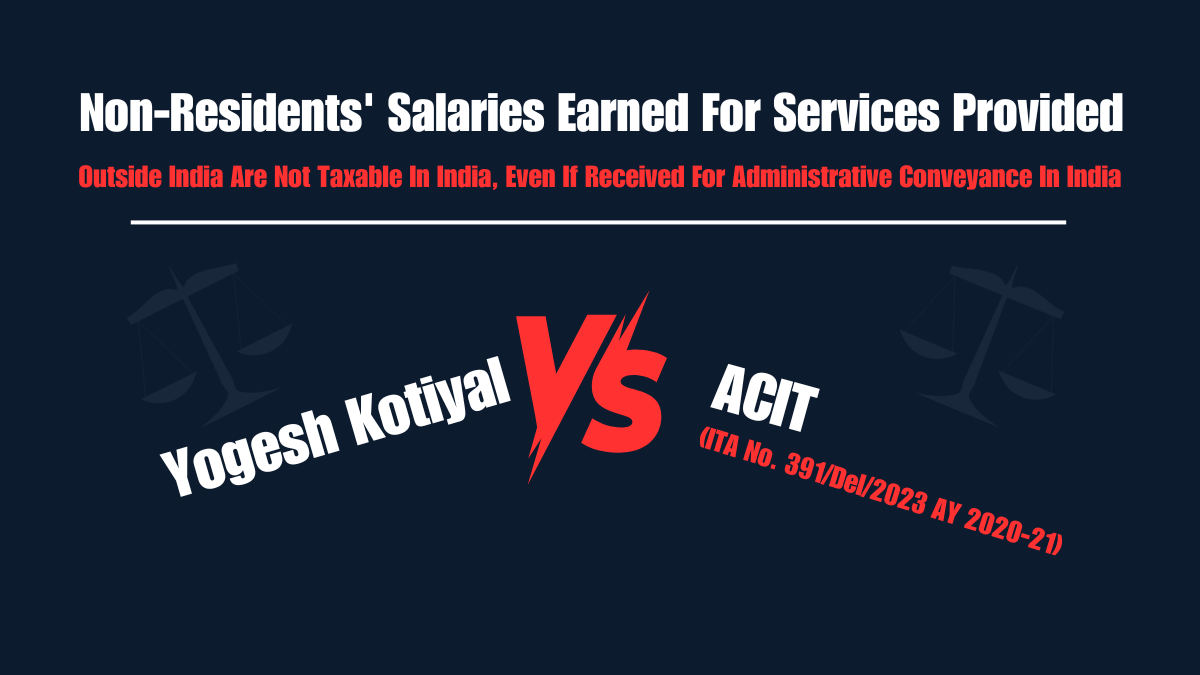Non-Residents Salaries Earned For Services Provided Outside India.
Yogesh Kotiyal vs ACIT (ITA No. 391/Del/2023 AY 2020-21)
The assessee, Yogesh Kotiyal, fulfilled the criteria stated in Section 6(1) of the Act for classification as a Non-Resident in India, owing to his limited stay in India during FY 2019-20. The assessee, an employee of Nokia Solutions and Networks India Private Limited (Nokia India), was on a foreign assignment in Australia during FY 2019–20. He performed employment and rendered services to Nokia Australia from August 23, 2017, to March 10, 2020, when he was relocated to Australia.
Throughout the Financial Year 2019–20, the assessee was physically present in Australia and engaged in employment while on assignment with Nokia Australia.
The assessee’s payroll remained in India for administrative convenience during his assignment to Australia, so he continued to receive salary and benefits while on his overseas assignment in India.
The assessee has claimed exemption of Rs.55,37,591/- on salary income received in India for the F.Y. 2019-20 for services rendered/ employment exercised in Australia under Article 15(1) of the India-Australia DTAA, read with Section 90 of the Act as he was Resident of Australia under Article 4(1) of the India- Australia DTAA.
According to section 90(2) of the Act, the Act’s provisions will apply to the assessee to the extent that they are more advantageous to them if a DTAA between India and the nation where the assessee’s income is subject to double taxation exists.
As a result, to assert exemption under Article 15(1) of the India-Australia DTAA, the following requirements must be met:
The candidate must meet two requirements: firstly, they must be an Australian resident; and secondly, the compensation must be earned through work performed in Australia.
According to Article 15(1) of the India-Australia DTAA read with Section 90 of the Act, the assessee’s salary of R s.55,37,591/-for work performed, or services rendered in Australia has been claimed as exempt from tax in India because the assessee was a resident of Australia and worked for Nokia Australia in Australia during the relevant Financial Year. Copies of the assignment agreement were produced by the assessee. Passport and Australian tax return attesting to the timely payment of taxes in Australia for the salary he received in India for work he performed in Australia. Additionally, the TRC was provided
during the DRP proceedings as additional evidence in support of the claim for exemption of Salary income under India- Australia DTAA.
The exemption of Rs. 55,37,591/-claimed by the assessee under Article 15(1) of the India-Australia DTAA read with Section 90 of the Act in relation to employment exercised and services rendered in Australia to Nokia Australia be allowed, based on the aforementioned rulings. The India-Australia DTAA’s Article 15(1) exemption has been denied by the AO on the grounds that the TRC has not been provided, despite the fact that other supporting documentation for tax residency in Australia has been properly provided. For example, an Australian tax return serves as proof of residency in Australia and of having paid taxes on time.
The undisputed facts are that:
- The assessee is an NRI.
- The assessee received salary for services rendered outside India.
- The assessee has paid taxes in Australia.
- Copy of the tax return filed Australian tax authority are filed before the revenue authorities.
- Assessee had a valid TRC.
Given these circumstances, the Income Tax Act of 1961’s Sections 5, 9, and 15 are examined to determine whether the salary paid by the Indian company to a non-resident is taxable. This section deals with the scope of total income and subjected to the other provisions of this Act. The taxable income includes income from all sources received, deemed to be received accrues and deemed to have accrued is taxable in India in case of a non-resident. Hence, it is imperative to examine the provisions of taxability of salary received by non-resident from an Indian company as per the provisions of section 9 of the Income Tax Act.
As per the provision of Section 9 (1)(ii), the income earned under head “Salaries” is taxable in India ” if it is earned” in India. The explanation issued for removal of doubts declares that ‘salaries if it is earned’ meets services rendered in India.
In the instant case the assessee neither had any rest period nor leave period which is preceded and succeeded by the services rendered outside India. Since, the assessee has rendered services outside India, the salary cannot be taxable in India.
As per the definition the salary paid or the advances received are to be included in the total income of the person when the salary becomes due. From the concurrent reading of Section 5 dealing with scope of total income, Section 15 dealing with computation of total income under the head salary and charge ability thereof and Section 9 dealing with income arising or accruing in India with reference to the
salaries and the services rendered in India, we hold that no taxability arises on the salary/allowances received by the assessee since the assessee is a non-resident and has rendered services outside India.
Thus, the assessee is eligible for exemption on his salary for services rendered in Australia employment exercised in Australia during his Australia assignment period.
Non-Residents Salaries Earned For Services Provided Outside India
To download the official order, click here.
“The site is for information purposes only and does not provide legal advice of any sort. Viewing this site, receipt of information contained on this site, or the transmission of information from or to this site does not constitute an attorney-client relationship.
The information on this site is not intended to be a substitute for professional advice.”

